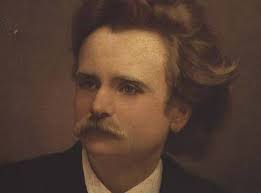


Norwegian composer and pianist, best known for becoming one of the leaders of Scandinavian music, with a great influence on future composers. His most widely known works are "Piano Concerto in A Minor" and "Peer Gynt".
He was born into a family that encouraged his early musical studies and provided the necessary musical background for him to flourish: his mother was known as the best piano teacher in Norway and many musicians visited the family, one of which had persuaded Edvard Grieg's parents to send him off to Liepzig Conservatory in Germany. He went to study music in Leipzig when he was a teenager. After graduating, he spent his time in Denmark where he married his cousin, Nina. Their daughter, Alexandra, died at the age of one and Edvard wrote after the funeral: "But thank God, if one has something to live for, one does not easily fall apart; and art surely has—more than many other things—this soothing power that allays all sorrow!".
The distinctive feature of his music is the reconciliation of classical music with Norwegian folk influences. Grieg once said: "The traditional way of life of the Norwegian people, together with Norwegian legends, history and national history, stamped itself on my creative imagination". He became a great champion of Norwegian music, art and theatre. He described his music in the following terms : "Artists like Bach and Beethoven erected churches and temples and ethereal heights. I want to build 'homes' for people in which they can be happy and contended". The 'homes' Grieg built were few. Many criticised him for his limited number of works. But others, like the influential Liszt, encouraged Grieg to follow his instincts. The support provided by Liszt and the dramatist and theatre director Bjonson, helped Grieg to establish a type of Norwegian national music movement.
He died of lung and heart failure, which was the final stage of a poor health from which he was suffering throughout his life due to a tuberculosis infection during his childhood. After he died, Grieg’s music came to be considered old-fashioned, but his influence was particularly apparent on the French composers of the early 20th century.